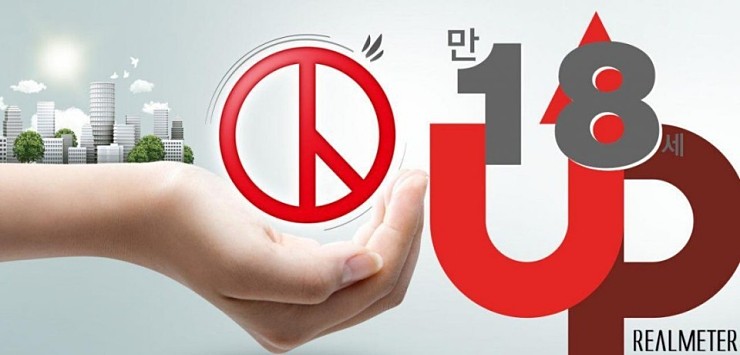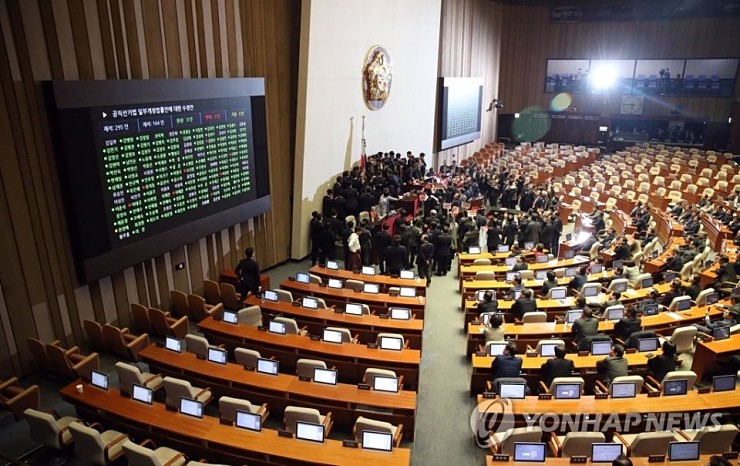On April 15, 2020, the 21st National Assembly election will be held in the Republic of Korea. But this year's election will be different from those before it, as the nation’s 18 year old citizens will have the right to vote for the first time in a presidential election. In previous elections, only people over the age of 19 were eligible to cast ballots. The idea has been making headlines in Korea as the debate rages on whether or not the decision will be good for our country. In my opinion, this policy change was the right thing to do for our democracy, giving our youth a direct influence on the outcome of our nation.
 |
| ▲ Lowering the voting age in 2020 (Photo from REALMETER) |
On April 24, 2019, lawmaker Sim Sang-jung, supported by 17 other members of the National Assembly, tabled an ‘election reform bill’ that included the controversial voting age change. Discussions surrounding the bill followed and in the end, Article 15, section 1 of the existing election law was amended to read ’A national of 18 years of age or above shall have a voting right for the elections of the President and the members of the National Assembly’. The revision passed on December 27, 2019 and after promulgation by the president on January 14, 2020, it became the law of the land. This means that citizens with birthdays from January 1 to April 16 are now eligible to vote in the presidential elections. Although controversial, there are several strong reasons to support lowering the voting age. First, more teenagers will be guaranteed their full rights as citizens in our democratic society. 18 year olds are young adults in the ROK and should have the right to fully participate in politics. They care and have a lot to contribute to society. The candlelight protests calling for the impeachment of former president Park in 2016 and reform of the prosecution in 2019 were stirred on by young adults involved in politics, proving they are interested in the outcome of their nation. Elections are a direct way for people to participate in politics and can be a valuable opportunity for these young adults to establish political thought.
In addition, lowering the voting age gives a voice to policies that are critical to the nation’s youth and forces policymakers to reflect their opinions in their programs. As a result, it can promote the growth of a civil society where a number of opinions are balanced and respected.
Furthermore, including 18 year olds in the election process means they will be forced to formulate their own opinions about candidates deterring undue influence by educators. Current law states that the political orientation of teachers should not influence their teaching and that they should remain politically neutral. Article 6 of the Fundamentals of Education Act (Neutrality in Public Education), states, “Education shall not be used as a tool for propagating any political, factional, or individual biased views.” While this is the law of the land, it is sometimes missing from practice. Last October, at In-heon High School in Gwanak-gu, Seoul, a teacher made controversial remarks about the former minister of justice Cho-Kuk during class. Also, a high school in Busan was criticized for including political opinions on their history exam. Therefore, with the propensity to express political opinions in education being prevalent in Korea, despite the illegality of it, students would be better served to inform themselves so as not to be swayed by undue influence in education. Instead, they will be able to question political views being expressed in class and the right to learn in an unbiased environment will be protected.
With the right to vote being extended to citizens over the age of 18, we can also achieve a higher-quality of democracy. This is because political participation and education regarding issues that matter will increase and include interest in the politics of teens. This will ensure the realization of democracy more effectively than before. Democracy is achieved by creating a state that addresses the needs of the people, reflecting diverse opinions from a variety of capable age groups. As the voting age has been revised, the scope of direct participation in politics has widened. If the number of citizens who participate directly in politics increases, a nation can gather more diverse opinions, and the people can actively exercise their rights to sovereignty. In other words, by setting up more teens as voters, democracy is enhanced and the significance of elections is greater.
In conclusion, changes to the election law that lower the voting age to 18 and over is a positive means to achieving the fundamental goals of participatory politics. It will widen the scope of voices being heard, ensure their participation in politics matters, influence the development of policies important for young adults, and preserve neutrality in education. At present, it is hard to predict the actual participation rate of 18-year-olds on April 15, but there is no doubt that the nation will benefit from including their voices in the process.
 |
| ▲ Election reform bill is being passed in the assembly plenary session. (Photo from Yonhap News) |
심민정 dankookherald@gmail.com

![[Campus Magnifier] Let's Surf the Library!](/news/photo/202404/12496_1765_4143.jpg) [Campus Magnifier] Let's Surf the Library!
[Campus Magnifier] Let's Surf the Library!
![[Campus Magnifier] Let's Surf the Library!](/news/thumbnail/202404/12496_1765_4143_v150.jpg)





